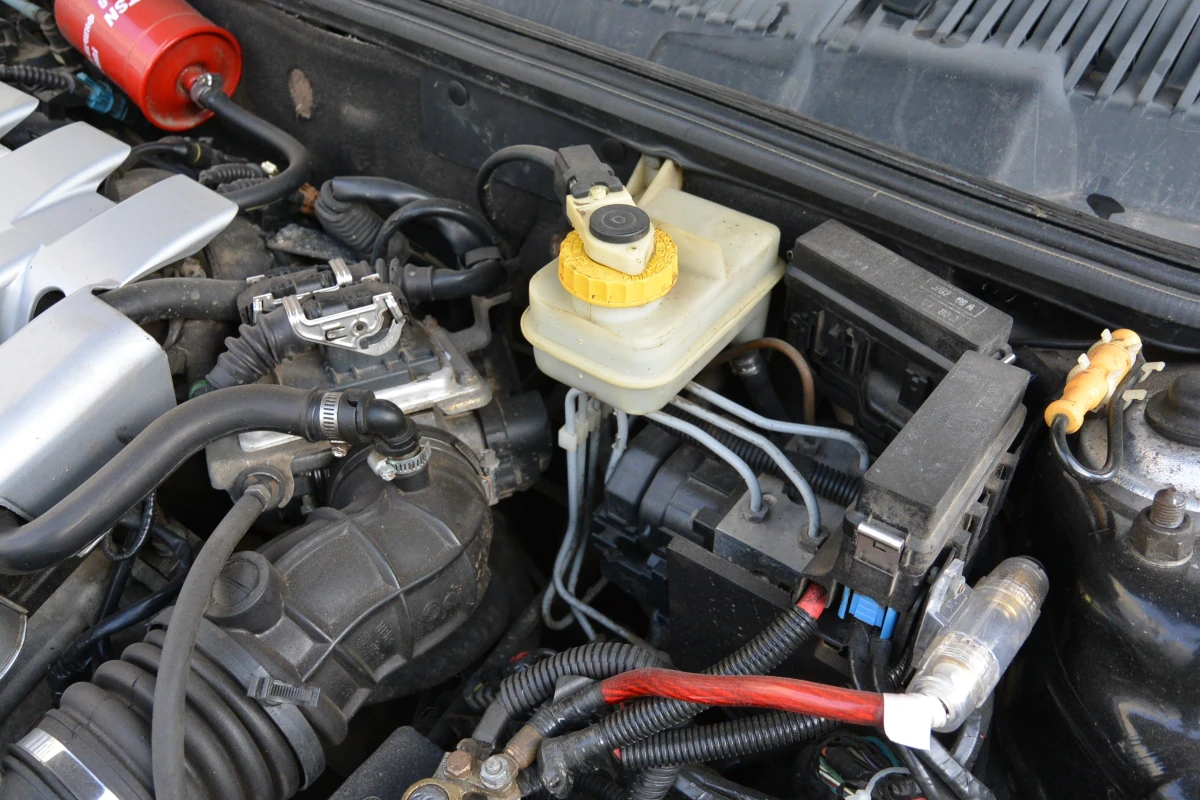We all know how important brake fluid is because of how it serves as the bridge or the middle man that applies the pressure from the brake pedal to the actual brakes.
Of course, we have different types of brake fluids, such as synthetic and non-synthetic, which have their own advantages and disadvantages. But can you actually mix synthetic brake fluid with non-synthetic brake fluid?
Why cant you mix synthetic brake fluid with non-synthetic?
You cannot mix synthetic and non-synthetic brake fluid. Most brake fluids that are DOT 5 or are silicone-based are considered synthetic compared to regular glycol-based brake fluid. DOT 5 brake fluid cannot be mixed together with any kind of brake fluid and should only be used on its own.

People often forget that different types of brake fluids are made using different ingredients. While there is no real “non-synthetic” brake fluid, glycol-based fluids are usually considered the non-synthetic variants and are compatible with different DOT 3 ratings except DOT 5, which is usually considered the synthetic variant. That means that, when switching to DOT 5, you need to completely flush out any glycol brake fluid.
Is all DOT 3 brake fluid synthetic?
One of the most important fluids that your car needs is the brake fluid because of how indispensable it is when it comes to how the entire brake system works. Without the brake fluid, your brakes will not be able to work because the fluid is what sends out the pressure to the brake to prompt them to move. And when it comes to the different brake fluids we have, they are rated according to their boiling point and viscosity.
DOT (Department of Transportation) is the rating that is given out to different types of brake fluids. They are usually rated 3, 4, 5, and 5.1, depending on certain factors and properties. DOT 3 brake fluid is one of the more common types of brake fluid. But is this brake fluid synthetic?
Before we talk more about the topic of brake fluid, it is important to say that there is no real “non-synthetic” brake fluid out there. That is because brake fluids are all based on oils that are synthetically made. In a way, the terms synthetic and non-synthetic are only used by companies as a marketing ploy to differentiate different types of brake fluids based on their DOT rating.
In most cases, brake fluids that are rated DOT 5 are the ones considered synthetic because they are made using silicone. Meanwhile, brake fluids such as DOT 3, 4, and 5.1 are the ones considered “non-synthetic”.
However, it is important to note that brake fluids like DOT 3 are still synthetic even though they are usually labeled non-synthetic. That is because these brake fluids are made using glycol, which is an oil-based chemical. In other words, there really is no non-synthetic brake fluid because no brake fluid is made using something that is organic or natural. But, for the purposes of this discussion, we shall refer to DOT 3, 4, and 5.1 as non-synthetic brake fluids while DOT 5 is synthetic.
Can you mix synthetic brake fluid with a regular one?
Now that you know what we mean by synthetic and non-synthetic or regular brake fluid, let us now look at whether or not it is okay to mix them.
So, when we talk about different regular brake fluids that are glycol-based such as DOT 3, 4, and 5.1, it is okay to mix them with one another without seeing a lot of differences in the performance of your brakes. Adding a higher DOT rating will only raise the boiling point of your brake fluid, but you are only going to get a half-baked brake fluid with a mixture of a lower and a higher DOT rating.
That means that, if you are mixing different DOT ratings of the regular brake fluid, only do so when you are planning to switch to a higher rating. There is no need to completely flush the old brake fluid out if you want to eventually use DOT 4 after using DOT 3.
However, if you are now talking about mixing DOT 3, 4, or 5.1 with DOT 5, then that is out of the question. You cannot mix these regular glycol-based brake fluids with a silicone brake fluid precisely because silicone and glycol do not mix with one another. this might result in a brake system that will not work properly or might even get damaged.
So, if you want to make the switch to the synthetic brake fluid, it is important that you completely empty out the brake fluid reservoir and then fill it up with DOT 5. Do not fill the tank with synthetic brake fluid while you still have non-synthetic brake fluid in it.
Is synthetic brake fluid better?
You might be wondering why there are people who choose between regular and synthetic brake fluids. Some might prefer using DOT 5 or silicone-based brake fluids. But is synthetic brake fluid the better option?
The most important thing you need to know here is that there is no brake fluid that is better than the other. Each brake fluid has its own advantage and disadvantage in terms of how well the brakes perform.
For the regular brake fluids that are glycol-based, the difference in their performance can be seen in higher boiling points. If you want a brake fluid that performs better when you are perhaps a racer or someone who likes to press the brakes hard, then DOT 4 and 5.1 are the better ones for you because of their higher boiling points. But they tend to absorb water more than DOT 3, and that means that they won’t last as long.
Meanwhile, the main selling point of silicone brake fluid, aside from its higher dry boiling point, is that it does not mix with moisture and will last for a long time. This means that this brake fluid is better for cars that are not always used. But the problem is that DOT 5 is not compatible with anti-brake locking systems and will always require bleeding due to how this brake fluid tends to absorb air.
How long does synthetic brake fluid last?
DOT 5 or synthetic brake fluid lasts longer than most other brake fluids because of its silicone-based structure, which does not mix with any kind of moisture. This means that you can allow the brake fluid to sit in the car for a long time without worrying about it going bad quickly.
In most cases, brake fluids should be changed somewhere between 1 to 2 years. However, DOT 5 brake fluids can go longer than that and could probably reach 2 to 3 years before going bad. This is why synthetic or silicone brake fluid is best for cars that are not always used, as the brake fluid will last for a very long time without the need to get changed.
Sources
Mixing DOT 4 with DOT 4 synthetic



